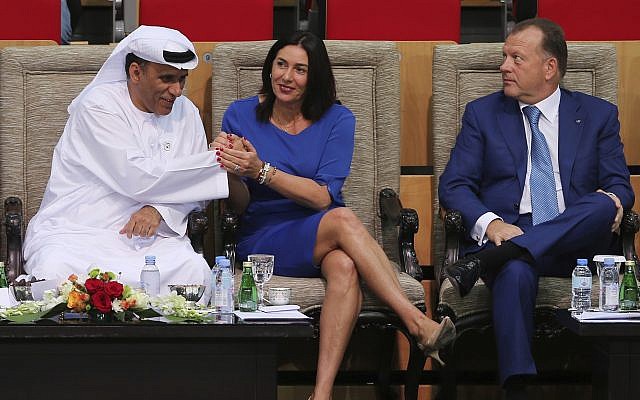Israelis and American Jews are celebrating this “feel good” moment, but Israel is trapped once again in the all too familiar game of having to pay for symbolic gestures with the hard currency of real and probably irreversible concessions.
By Moshe Phillips
Nobody likes being hated. Terrorism, boycotts, and relentless international criticism have left many Israelis – and Jews around the world – feeling exhausted and desperate. So when an Arab leader, no matter how insignificant, indicates that he might stop hating Israel, many Jews see it as a cause for celebration.
But is it really sound policy to make concrete, and probably irreversible, concessions in exchange for gestures and unenforceable promises?
Settler leaders have publicly criticized Israel’s peace deal with the United Arab Emirates (UAE), with one spokesman stating that “a historic opportunity to apply sovereignty over the Jordan Valley, the northern Dead Sea and the settlements” has been thrown away.
Unfortunately, though, Jewish groups in the U.S. that have traditionally been the settlement movement’s strongest backers have shown it zero support now.
Such behavior is curious. After all, the United Arab Emirates poses no threat to Israel. The little Gulf fiefdom has existed less than 50 years and has a population smaller than that of Haiti. Its army has never fought a war – not against Israel or anyone else. What Israel will get from its agreement with the UAE falls strictly into the realm of gestures: a UAE embassy in Israel (in Tel Aviv, not in Jerusalem, you can be sure), and some flights between the two nations.
There will be trade and various types of cooperation between Israel and the UAE, but that has already been going on for a long time. Now it will just become slightly more public.
The problem is that an embassy can be shut down on a moment’s notice. An established flight route or a trade agreement can be canceled with one phone call. How do we know? Because it already happened – with other Gulf kingdoms.
Following the signing of the Oslo Accords in 1993, Israel established diplomatic or trade offices in Bahrain, Oman, and Qatar. These moves were hailed as major breakthroughs for peace. But a few years later, when Arafat launched the Second Intifada, all that was gone. As punishment for Israel defending itself against suicide bombers and lynch mobs, those Arab Gulf regimes broke off their relations. Later, some of them found it was beneficial to them to unofficially reestablish some contacts.
They acted according to what was useful to them, not because of any sincere, permanent change of heart regarding Israel or Jews. The UAE’s new agreement with Israel is useful to the UAE right now; the minute it becomes less useful – for whatever reason – the agreement will not be worth the paper it was printed on.
The pattern was established with the Oslo agreement. Israel made concrete, on-the-ground concessions – it agreed to the creation of the Palestinian Authority, a self-governing entity that occupies 40 percent of Judea-Samaria and shelters and sponsors terrorism against Israel. In exchange, Israel received gestures: unenforceable promises of peace by the PA and offices in several tiny Gulf countries. That made both Israelis and world Jewry feel good. It tasted like “normalization.” But this vanished as quickly as it had arrived.
The creation of the PA was an almost-irreversible concession. In theory, Israel could dismantle the PA. In practice, doing so would result in so much international condemnation and punitive actions that probably no Israeli government will ever do it. The same is sadly true of the new UAE agreement.
Israelis and American Jews are celebrating this “feel good” moment. One U.S.-based pro-Israel group on the right announced that it is “profoundly grateful” for this “momentous day.” Another declared that it is “thrilled” by this “game-changing” agreement.
But the game has not changed. In fact, Israel is trapped once again in the all too familiar game of having to pay for symbolic gestures with the hard currency of real and probably irreversible concessions – this time the suspension of applying Israeli law to any part of Judea-Samaria.
In theory, a future Israeli government could proceed with applying Israeli law there. But in practice, doing so would result in the UAE breaking off relations. And if any other Gulf sheikhdoms follow the UAE in signing deals with Israel in the days ahead, they too will condition their recognition on Israel refraining from applying sovereignty.
Thus, any future Israeli decision to proceed with sovereignty will mean multiple Arab states breaking off relations, not to mention massive international condemnations, U.N. resolutions, American pressure, and the like. It is highly unlikely that any Israeli government would have the courage to do that.
Supporting Jewish sovereignty and development throughout the undivided Land of Israel, and opposing creation of a Palestinian Arab state in the Jewish homeland, have never been popular stands to take. They have meant defying the United Nations, the New York Times, and the Union for Reform Judaism, among others. It means being disliked by many Democrats. And now, unfortunately, it also means coming into conflict with the Trump administration.
It may feel “thrilling” for a moment to bask in the warm attention of some Gulf dictator, and to find oneself on the same side as a president or an important newspaper. But that is not the Jewish way to evaluate political or diplomatic developments. The very essence of both Judaism and Zionism is the willingness to remain loyal to eternal principles and beliefs, even if nobody else in the world will accept them.
This article first appeared in the Jewish Press.





